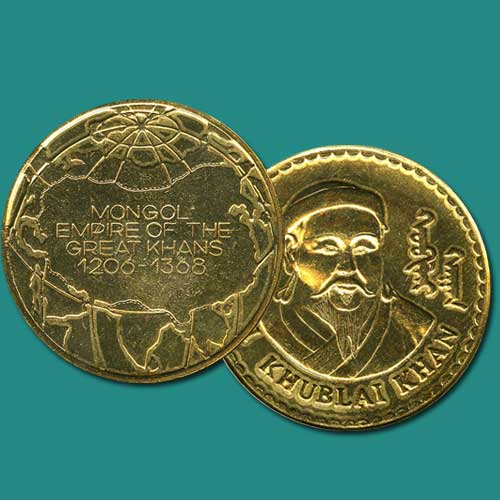Kublai Khan and the Mongol Empire
2020-09-23 Wed
Kublai also is known as the Emperor Shizu of Yuan was the fifth khagan of the Mongol Empire. Grandson of Genghis Khan, Kublai became emperor of China in 1271, founding the Yuan Dynasty, which lasted until 1368.Kublai's real power was limited to China and Mongolia, though as Khagan he still had influence in the Ilkhanate of Persia (present-day Iran). He was the overlord of all the other Mongol dominions, which included areas as diverse as that of the Golden Horde in southern Russia, and the steppe heartlands where Mongol princes were still living the traditional nomadic life.
If one counts the Mongol Empire at that time as a whole, his realm reached from the Pacific Ocean to the Black Sea, from Siberia to what is now Afghanistan. After the Mongol Empire began their campaigns against the Tanguts, Khitans, and Jurchens they started to cast their own copper cash coins with the inscription "Da Chao Tong Bao". It is currently unknown if these coins were already cast under Genghis Khan or if production started under Kublai Khan during the Yuan dynasty as these coins are undocumented and rare.
Production of Yuan dynasty copper coins with the "Zhong Tong Yuan Bao" coins commissioned by Kublai Khan started concurrently with the issuance of paper money which was backed up by silver sycees. The above-shown coin represents the Bust of Kublai Khan to front. On the other hand, the reverse side engraved Map showing the Mongol Empire.
Image Source: https://www.britishmuseum.org/
Latest News
-
Gold Pagoda of Vijaynagar Empire King Deva Raya I
2024-04-10 WedKing Deva Raya I of the Vijayanagara Empire was a patron of Kannada literature and architecture. He ...
-
Silver Denarius of Septimus Severus
2024-04-05 FriLucius Septimius Severus served as the Roman emperor from 193 to 211 AD. Severus sat on the throne o...
-
Extremely rare 'Malaharamari' type Gold Gadyana of King Guhalladeva-III Sold for INR 611000
2024-04-03 WedTribhuvanamalla, also known as Guhalladeva III, was the ruler of the Kadamba dynasty. His reign coin...
-
90 Years of RBI
2024-04-02 TueOn 1st April, PM #Modi unveiled a special commemorative coin marking 90 Years since the foundation o...
-
Silver Denarius of Julia Mamaea
2024-04-02 TueJulia Avita Mamaea, a Christian Syrian noblewoman, was the mother of Roman Emperor Alexander Severus...

